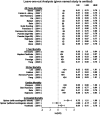Association between hyponatremia and adverse clinical outcomes of heart failure: current evidence based on a systematic review and meta-analysis
- PMID: 38204798
- PMCID: PMC10777843
- DOI: 10.3389/fcvm.2023.1339203
Association between hyponatremia and adverse clinical outcomes of heart failure: current evidence based on a systematic review and meta-analysis
Abstract
Background: Heart failure (HF) is a global health challenge. The perturbations in fluid and electrolyte equilibrium, particularly the compromised sodium balance associated with HF lead to high mortality rates. Hence, elucidating the correlation between serum sodium levels and the prognosis of HF is of paramount importance. This study aimed to conduct a comprehensive meta-analysis to thoroughly investigate the interplay between hyponatremia and the prognostic outlook of individuals with HF.
Methods: A comprehensive search of bibliographic databases including PubMed, Embase, and the Cochrane Central Register of Controlled Trials was conducted to identify relevant observational studies examining the association between hyponatremia and prognosis of HF. Data extraction, synthesis, and assessment of risk of bias were conducted. Meta-analytic methods, sensitivity analyses, and heterogeneity test were employed as appropriate to synthesize the data.
Results: A total of 43,316 patients with HF were included spanning 25 selected studies. The pooled data revealed a notable association between hyponatremia and elevated risks across short and long-term mortality of HF. Specifically, hyponatremia was found to significantly increase the likelihood of all-cause mortality (Hazard ratio [HR] = 1.94, 95% confidence interval [CI]: 1.78-2.12); 1-year mortality (HR = 1.67, 95%CI: 1.46-1.90); 30-day mortality (HR = 2.03, 95%CI: 1.73-2.25); cardiac mortality (HR = 2.11, 95%CI: 1.81-2.46); and in-hospital mortality (HR = 1.64, 95%CI: 1.15-2.34).
Conclusion: Our meta-analysis emphasizes the significant impact of hyponatremia on mortality in the HF patient population, highlighting the critical importance of maintaining stable serum sodium levels in HF management.
Keywords: adverse events; heart failure; hyponatremia; meta-analysis; mortality.
© 2023 Zhao, Qin, Lu, Wang, Qiao and Li.
Conflict of interest statement
The authors declare that the research was conducted in the absence of any commercial or financial relationships that could be construed as a potential conflict of interest. The reviewer YG declared a past co-authorship with the author YL to the handling editor.
Figures






Similar articles
-
Community-based care for the specialized management of heart failure: an evidence-based analysis.Ont Health Technol Assess Ser. 2009;9(17):1-42. Epub 2009 Nov 1. Ont Health Technol Assess Ser. 2009. PMID: 23074521 Free PMC article.
-
Association between serum sodium level trajectories and survival in patients with heart failure.ESC Heart Fail. 2023 Feb;10(1):255-263. doi: 10.1002/ehf2.14187. Epub 2022 Oct 3. ESC Heart Fail. 2023. PMID: 36193558 Free PMC article.
-
Characterization and prognostic value of persistent hyponatremia in patients with severe heart failure in the ESCAPE Trial.Arch Intern Med. 2007 Oct 8;167(18):1998-2005. doi: 10.1001/archinte.167.18.1998. Arch Intern Med. 2007. PMID: 17923601 Clinical Trial.
-
Prognostic Significance of Hyponatremia in ST-elevation Myocardial Infarction/Heart Failure Patients.Cureus. 2019 Sep 16;11(9):e5673. doi: 10.7759/cureus.5673. Cureus. 2019. PMID: 31720149 Free PMC article. Review.
-
Prognostic significance of delirium in patients with heart failure: a systematic review and meta-analysis.Front Cardiovasc Med. 2023 Aug 11;10:1217965. doi: 10.3389/fcvm.2023.1217965. eCollection 2023. Front Cardiovasc Med. 2023. PMID: 37636295 Free PMC article. Review.
Cited by
-
Advancements and challenges in pediatric dilated cardiomyopathy: a comprehensive review of current approaches and future directions.Eur J Pediatr. 2025 Aug 12;184(9):546. doi: 10.1007/s00431-025-06263-w. Eur J Pediatr. 2025. PMID: 40794194 Review.
-
Impact of hypotonic hyponatremia on outcomes in patients undergoing transcatheter aortic valve replacement: a national inpatient sample.BMC Cardiovasc Disord. 2025 Mar 10;25(1):168. doi: 10.1186/s12872-025-04564-4. BMC Cardiovasc Disord. 2025. PMID: 40065236 Free PMC article.
-
First-time seizure revealing late-onset Fahr's disease: a case report and brief literature review.Front Hum Neurosci. 2024 Nov 22;18:1456610. doi: 10.3389/fnhum.2024.1456610. eCollection 2024. Front Hum Neurosci. 2024. PMID: 39651493 Free PMC article.
-
Advanced chronic kidney disease coexisting with heart failure: navigating patients' management.Clin Kidney J. 2025 May 2;18(5):sfaf128. doi: 10.1093/ckj/sfaf128. eCollection 2025 May. Clin Kidney J. 2025. PMID: 40395996 Free PMC article. Review.
-
Correction Rates and Clinical Outcomes in Hospitalized Adults With Severe Hyponatremia: A Systematic Review and Meta-Analysis.JAMA Intern Med. 2025 Jan 1;185(1):38-51. doi: 10.1001/jamainternmed.2024.5981. JAMA Intern Med. 2025. PMID: 39556338
References
-
- Vos T, Flaxman AD, Naghavi M, Lozano R, Michaud C, Ezzati M, et al. Years lived with disability (YLDs) for 1160 sequelae of 289 diseases and injuries 1990–2010: a systematic analysis for the global burden of disease study 2010. Lancet. (2012) 380(9859):2163–96. 10.1016/S0140-6736(12)61729-2 - DOI - PMC - PubMed
LinkOut - more resources
Full Text Sources
Research Materials
Miscellaneous

